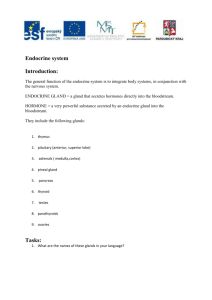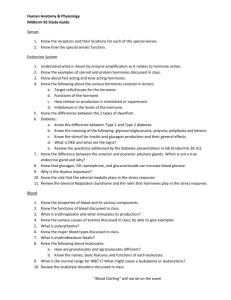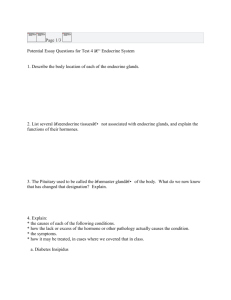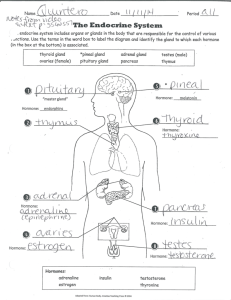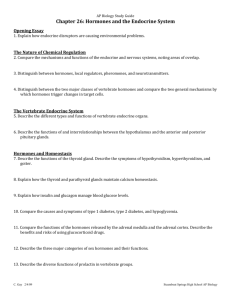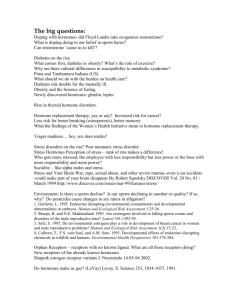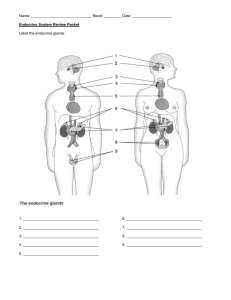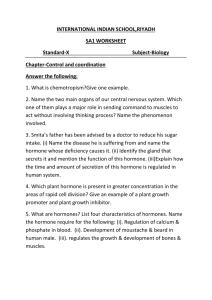Name_________________ Period ____ Endocrine System
advertisement
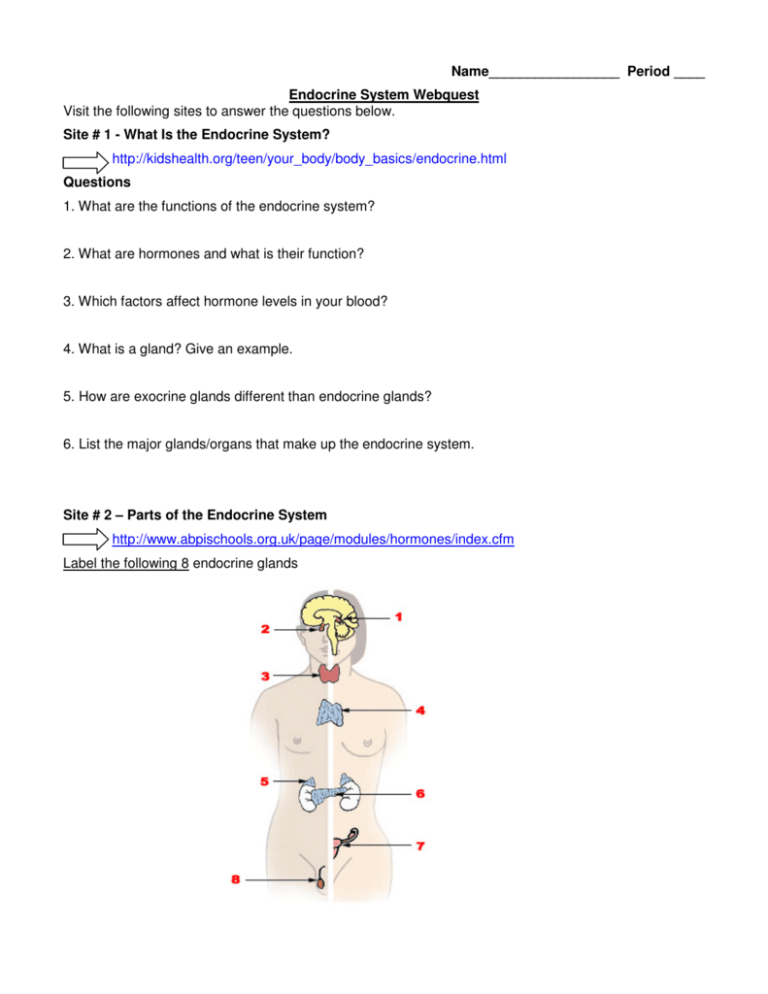
Name_________________ Period ____ Endocrine System Webquest Visit the following sites to answer the questions below. Site # 1 - What Is the Endocrine System? http://kidshealth.org/teen/your_body/body_basics/endocrine.html Questions 1. What are the functions of the endocrine system? 2. What are hormones and what is their function? 3. Which factors affect hormone levels in your blood? 4. What is a gland? Give an example. 5. How are exocrine glands different than endocrine glands? 6. List the major glands/organs that make up the endocrine system. Site # 2 – Parts of the Endocrine System http://www.abpischools.org.uk/page/modules/hormones/index.cfm Label the following 8 endocrine glands Site #3 – Hormones in the Endocrine System http://www.hopkinsmedicine.org/healthlibrary/conditions/endocrinology/hormones_and_the_endo crine_system_85,P00402/ Hormone Location Function Oxytocin ADH GH FSH/LH Estrogen Progesterone Testosterone Aldosterone Insulin Glucagon Corticosteroid Thyroid hormone (TH) Parathyroid hormone (PTH) Site #4: Use the following website to answer these questions: http://www.abpischools.org.uk/page/modules/hormones/index.cfm 1. What two hormones start the production of male and female sex hormones? (Click on page 3) 2. What is the male sex hormone? What is the female sex hormone? 3. Click on page 4 and examine the menstruation cycle graph. Click Play (make sure to watch the graph and the diagram at the same time). a. At which day is the egg released? ________ b. Which day is the estrogen level the highest? _________ c. Which day is the progesterone level the highest? ________ d. Which day is the LH level the highest? ______ e. Which day does menstruation begin? _______ 4. Click on page 6. What is the main difference between Type 1 and Type 2 Diabetes? 5. Click on page 7. a. What gland controls the release of Growth Hormone? b. Examine the graphs on the page. What age in boys does going slow? ______ For girls? ________ Site #5: The Impact of Stress Use the information in the link below to answer the following questions: Link: http://www.wisc-online.com/objects/index_tj.asp?objID=AP13804 1. What main gland is involved with the stress response? 2. What part of the nervous system does the hypothalamus interact with? 3. Explain the physiological changes that occur when the hypothalamus stimulates the sympathetic nervous system. You can make a flowchart or a simple step process. Be sure to include ALL chemicals/hormones secreted, glands involved and the functions of each chemical/hormone. 4. Why is physical exercise often suggested if you experience an abundance of stress? Site #6: The Hypothalmic-Pituitary-Endocrine Axis and Positive and Negative Feedback Loops Use the information in the following link to answer the questions below. Link: http://highered.mcgrawhill.com/sites/9834092339/student_view0/chapter46/positive_and_negative_feedback.html a. What is the difference between negative and positive feedback? Discuss them in terms of the changes in the process vs. the changes in the amount of the product. Hint: Read the text above the animation! b. In the animation, what hormone stimulates the release of GnHR and LH? c. Explain why the interaction between estrogen, GnHR and LH prior to ovulation is considered to be a positive feedback loop (effect)? Hint: review the definitions of positive feedback loops. d. After ovulation, what hormone is released in response to increased levels of LH? e. Explain why the interaction between progesterone, GnHR and LH after ovulation is considered a negative feedback loop (effect)? Hint: review the definitions of negative feedback loops. For each of the situations described below, explain which hormone(s) might be responsible for the condition as well as which endocrine gland(s) is/are responsible for producing the hormone(s). 1. A 15 year old boy who still displays all the physical characteristics of boys 4-5 years younger than him and has not begun to show any developmental changes indicating he is entering manhood. Hormone(s): Gland where produced: 2. Parents of a 5 year old girl are told by doctors that the reasons for the girl’s chronic illnesses are a weak immune system and low T-lymphocyte count. Hormone(s): Gland where produced: 3. A recently divorced middle-aged man who has also changed jobs and works long hours because he is stressed about receiving a promotion goes to the doctor because he has been gaining a lot of weight, especially in his abdominal region. The doctor notices that his face looks swollen and his blood-sugar levels are low. The doctor advises him to do some activities that will reduce stress and raise his metabolism in order to lose weight. Hormone(s): Gland where produced: 4. A patient comes into the ER complaining of a dizzy feeling. Doctors notice the patient has extremely low blood-sugar levels. Further testing reveals that the patient has a hypersecretion of ___ which is causing the problem so they prescribe and administer doses of the hormone ___ to counteract the body’s hypersecretion. Hormone(s): Gland where produced: 5. A woman in her mid-20’s has been having trouble falling asleep. Tests reveal that she has low levels of the hormone ___. Hormone(s): Gland where produced: 6. A woman brings her child into the doctor to determine the cause of the child’s small stature and extremely slow growth rate. There is no hereditary history of dwarfism in the family. Hormone(s): Gland where produced:
